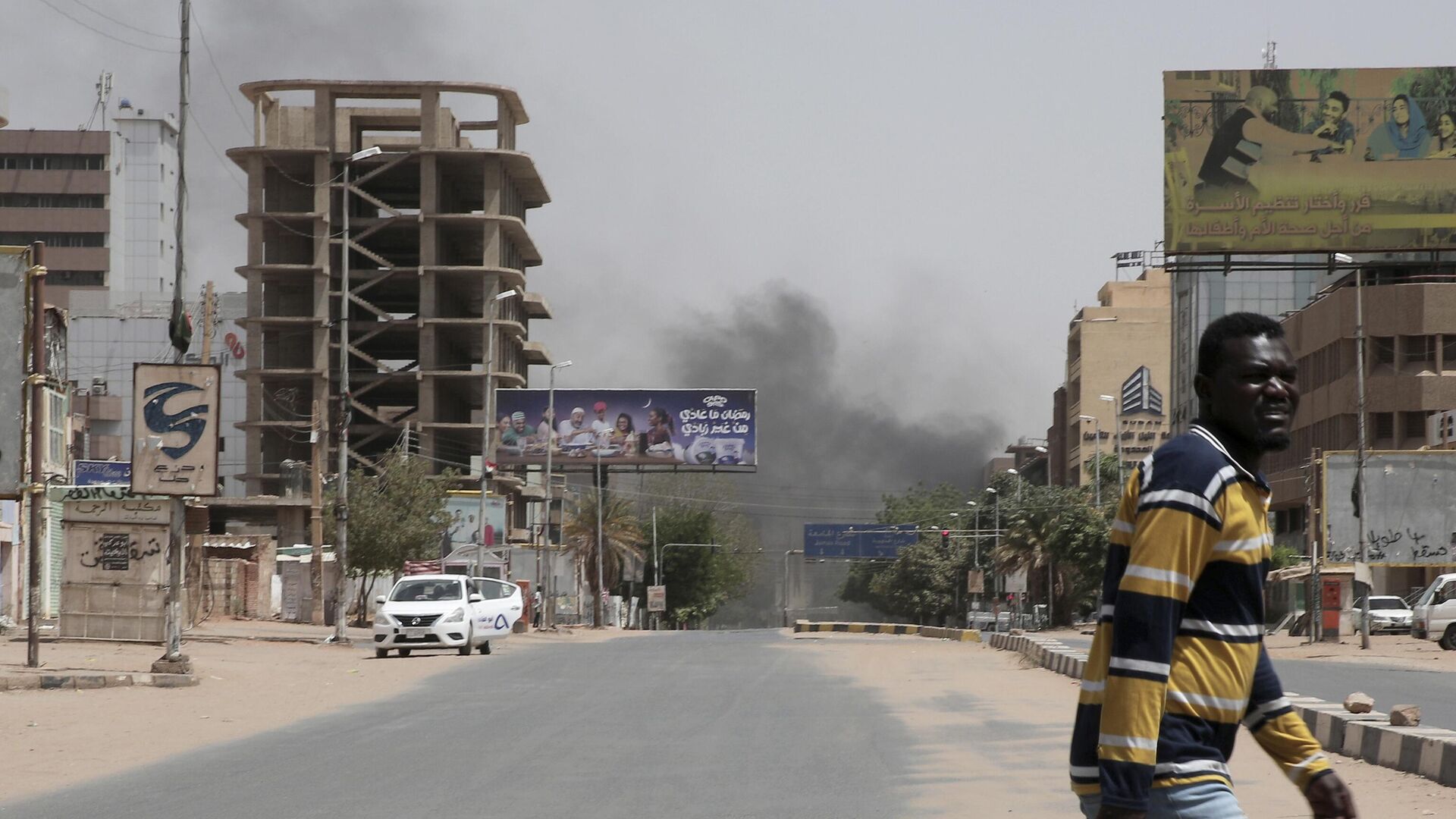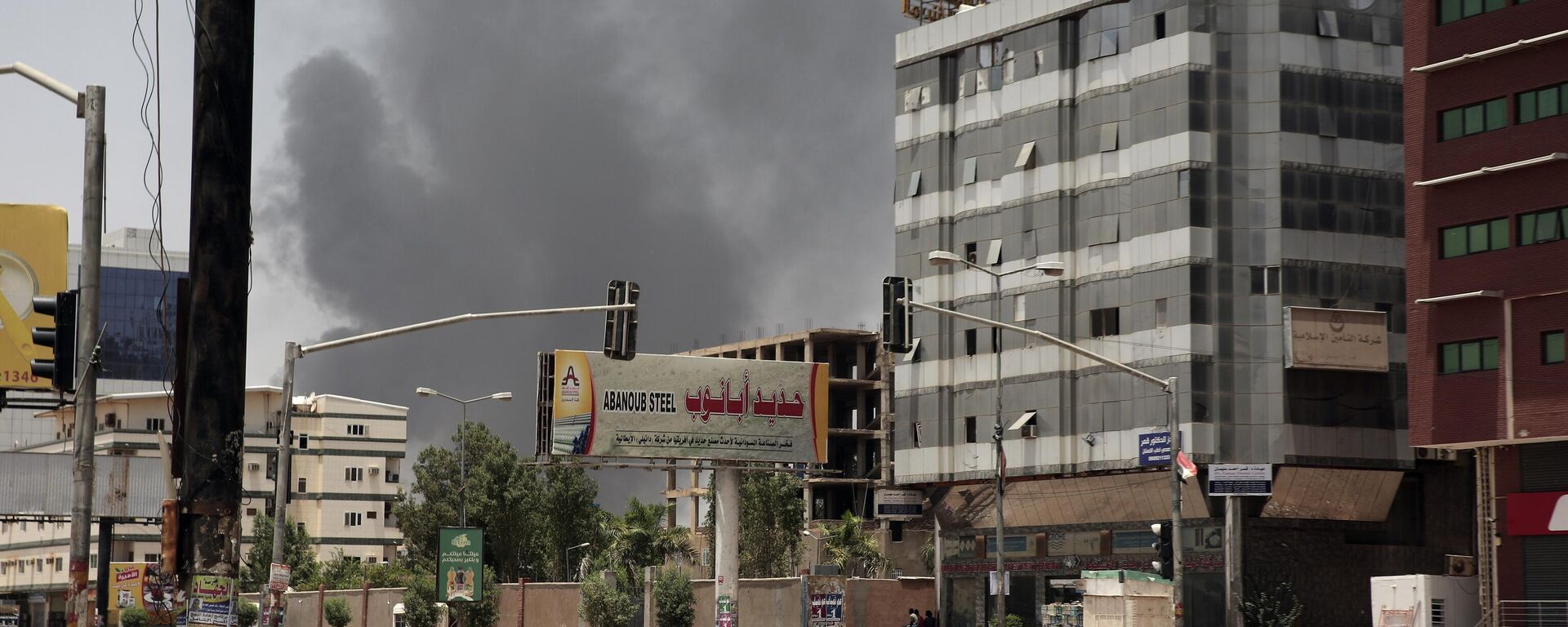https://sputnikglobe.com/20230728/sudan-conflict-forces-34-million-people-to-flee-to-neighboring-countries---who-1112202449.html
Sudan Conflict Forces 3.4 Million People to Flee to Neighboring Countries - WHO
Sudan Conflict Forces 3.4 Million People to Flee to Neighboring Countries - WHO
Sputnik International
The conflict in Sudan has forced a total of 3.4 million people to flee to refuge in neighboring countries, who are now facing rapidly intensifying health threats, the World Health Organization (WHO) said Thursday.
2023-07-28T03:13+0000
2023-07-28T03:13+0000
2023-07-28T03:10+0000
africa
sudan
north africa
medecins sans frontieres (msf)
world health organization (who)
health
illness
https://cdn1.img.sputnikglobe.com/img/07e7/04/10/1109565076_0:126:3072:1854_1920x0_80_0_0_2a37833bb60caabc351512ea16a45f0d.jpg
"The conflict in Sudan that has forced 3.4 million people to flee for safety within the country and across its borders is rapidly intensifying health threats, with cases of infectious diseases and other afflictions reported among the displaced population who have sought refuge in hard-to-reach locations with limited health services," WHO said on the website. Nearly 760,00 displaced people have sought refuge in the neighboring Central African Republic (CAR), Chad, Egypt, Ethiopia and South Sudan, WHO said, adding that the organization's staff continues to support national authorities of these countries in providing health assistance. In Chad, which is receiving an average of 2,500 people daily, over 1,400 trauma cases have been identified and treated. Cases of malaria and suspected cases of yellow fever have been identified in the CAR in some 17,000 refugees, including children under five years of age. A suspected cholera outbreak has also been reported in northern Ethiopia, which is receiving a large number of refugees. The influx of over 176,000 refugees into South Sudan "has overstretched facilities in the northern Renk region, where an upsurge of acute watery diarrhea among under-five-year-olds is driving up mortality," with a significant rise in severe acute malnutrition and measles among children under five years being having been recorded, WHO said. Medecins Sans Frontieres (MSF), which translates as Doctors Without Borders, also said Thursday, citing local authorities, that over "140,000 people, mostly South Sudanese women and children fleeing from Khartoum, have newly arrived in White Nile state since conflict broke out in Sudan."It was further noted that they and are now facing "huge unmet needs for food, shelter, health care, and water and sanitation in 10 camps, which host around 387,000 people."
https://sputnikglobe.com/20230620/russian-foreign-ministry-source-calls-us-embassy-in-khartoum-responsible-for-sudan-crisis-1111312493.html
africa
sudan
north africa
Sputnik International
feedback@sputniknews.com
+74956456601
MIA „Rossiya Segodnya“
2023
Sputnik International
feedback@sputniknews.com
+74956456601
MIA „Rossiya Segodnya“
News
en_EN
Sputnik International
feedback@sputniknews.com
+74956456601
MIA „Rossiya Segodnya“
Sputnik International
feedback@sputniknews.com
+74956456601
MIA „Rossiya Segodnya“
sudan, world health organization, refuge in neighboring countries, sudan conflict
sudan, world health organization, refuge in neighboring countries, sudan conflict
Sudan Conflict Forces 3.4 Million People to Flee to Neighboring Countries - WHO
MOSCOW (Sputnik) - The conflict in Sudan has forced a total of 3.4 million people to flee to refuge in neighboring countries, who are now facing rapidly intensifying health threats, the World Health Organization (WHO) said Thursday.
"The conflict in Sudan that has forced 3.4 million people to flee for safety within the country and across its borders is rapidly intensifying health threats, with cases of infectious diseases and other afflictions reported among the displaced population who have sought refuge in hard-to-reach locations with limited health services," WHO said on the website.
Nearly 760,00 displaced people have sought refuge in the neighboring Central African Republic (CAR), Chad, Egypt, Ethiopia and South Sudan, WHO said, adding that the organization's staff continues to support national authorities of these countries in providing health assistance.
"In Sudan itself, the health crisis has reached gravely serious levels as more than two-thirds of hospitals remain out of service amid increasing reports of attacks on health facilities. Between 15 April and 24 July 2023, WHO verified 51 attacks on health facilities, resulting in 10 deaths and 24 injuries—and cutting off access to urgently needed care," the statement said.
In Chad, which is receiving an average of 2,500 people daily, over 1,400 trauma cases have been identified and treated. Cases of malaria and suspected cases of yellow fever have been identified in the CAR in some 17,000 refugees, including children under five years of age.
A suspected cholera outbreak has also been reported in northern Ethiopia, which is receiving a large number of refugees. The influx of over 176,000 refugees into South Sudan "has overstretched facilities in the northern Renk region, where an upsurge of acute watery diarrhea among under-five-year-olds is driving up mortality," with a significant rise in severe acute malnutrition and measles among children under five years being having been recorded, WHO said.
Medecins Sans Frontieres (MSF), which translates as Doctors Without Borders, also said Thursday, citing local authorities, that over "140,000 people, mostly South Sudanese women and children fleeing from Khartoum, have newly arrived in White Nile state since conflict broke out in Sudan."
It was further noted that they and are now facing "huge unmet needs for food, shelter, health care, and water and sanitation in 10 camps, which host around 387,000 people."
Since April 15, fighting has been going on in Sudan between the Rapid Support Forces, commanded by Mohamed Hamdan Dagalo, and the regular army.
The parties have been exchanging contradictory statements about the success of the fighting and control of facilities, and have launched a large-scale information war in the media and social networks.
The situation in the country is not improving despite talks between the warring parties in Jeddah that began on May 6.



